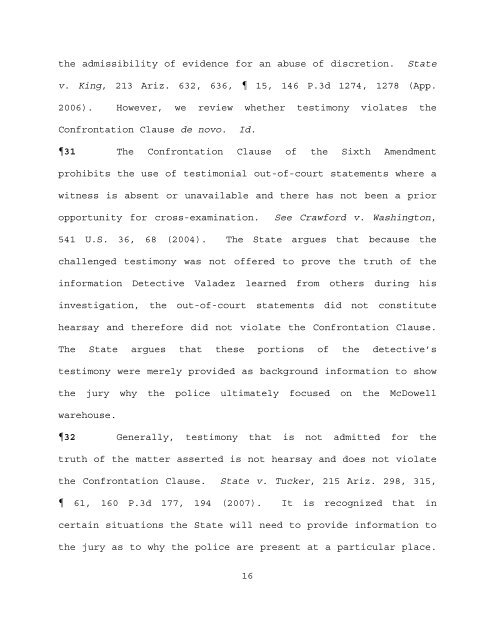1 CA-CR 07-0177-91122
1 CA-CR 07-0177-91122
1 CA-CR 07-0177-91122
You also want an ePaper? Increase the reach of your titles
YUMPU automatically turns print PDFs into web optimized ePapers that Google loves.
the admissibility of evidence for an abuse of discretion. State<br />
v. King, 213 Ariz. 632, 636, 15, 146 P.3d 1274, 1278 (App.<br />
2006). However, we review whether testimony violates the<br />
Confrontation Clause de novo. Id.<br />
31 The Confrontation Clause of the Sixth Amendment<br />
prohibits the use of testimonial out-of-court statements where a<br />
witness is absent or unavailable and there has not been a prior<br />
opportunity for cross-examination.<br />
See Crawford v. Washington,<br />
541 U.S. 36, 68 (2004). The State argues that because the<br />
challenged testimony was not offered to prove the truth of the<br />
information Detective Valadez learned from others during his<br />
investigation, the out-of-court statements did not constitute<br />
hearsay and therefore did not violate the Confrontation Clause.<br />
The State argues that these portions of the detective’s<br />
testimony were merely provided as background information to show<br />
the jury why the police ultimately focused on the McDowell<br />
warehouse.<br />
32 Generally, testimony that is not admitted for the<br />
truth of the matter asserted is not hearsay and does not violate<br />
the Confrontation Clause. State v. Tucker, 215 Ariz. 298, 315,<br />
61, 160 P.3d 177, 194 (20<strong>07</strong>). It is recognized that in<br />
certain situations the State will need to provide information to<br />
the jury as to why the police are present at a particular place.<br />
16


